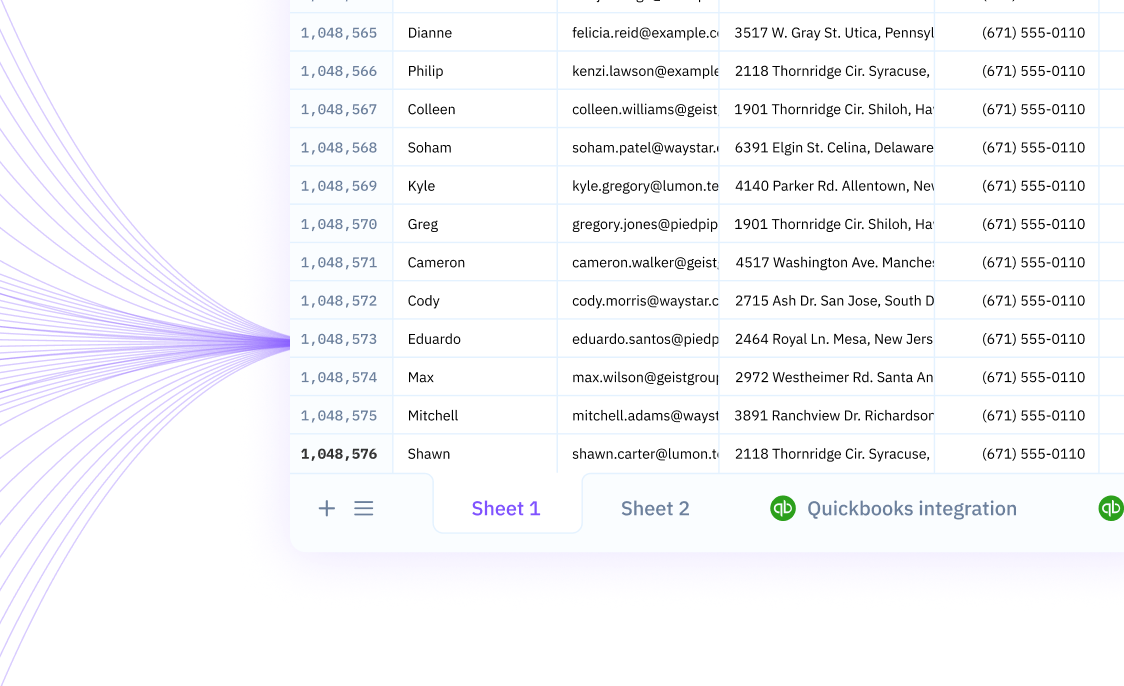
Export ColdFusion to CSV

Overview
Welcome to your comprehensive guide on exporting data from ColdFusion to CSV format. ColdFusion is a powerful platform for building and deploying web and mobile applications, and the ability to export data into CSV files is invaluable. It simplifies data manipulation, especially when transferring data into spreadsheets for analysis or reporting. CSV exports are favored due to their ease of buffering compared to other formats like Excel, which requires buffering the entire document in memory. On this page, we'll explore the essentials of ColdFusion, the straightforward process of exporting to CSV using tools such as 'export2csv.cfm', practical use cases for this functionality, and an innovative alternative to CSV exports using Sourcetable. Additionally, we offer a helpful Q&A section to address your queries about exporting data from ColdFusion to CSV.
What is ColdFusion?
ColdFusion, created by Adobe, is a versatile application server that facilitates web development on the server side. As a software tool, it offers a scalable architecture, making it suitable for coders of all skill levels by simplifying the web development process. With built-in security features, ColdFusion provides a secure environment for developing and deploying web applications. It also boasts seamless integration with other systems, making it an ideal choice for building applications that need to handle high traffic volumes.
In addition to its core capabilities, ColdFusion is recognized for its service aspects, including a wide range of built-in functionalities that contribute to its ease of use. It can be deployed on various cloud platforms such as AWS, Azure, and GCP, as well as on-premises, without requiring code rewrites. The software's ability to handle fluctuations in traffic and demand easily adds to its robustness and reliability as a service.
From a data perspective, ColdFusion is equipped with a powerful database management system, supporting multi-cloud storage services and RDS databases. It features an extensive performance monitoring toolset that helps in assessing cloud metrics, GraphQL, cluster and node metrics, data source metrics, and more. This toolset also aids in configuring and securing communications with HTTPS/SSL, ensuring optimal performance and security of the applications deployed.
Exporting Data to CSV in ColdFusion
Using EasyXLS Excel Library
ColdFusion can export data to a CSV file using the EasyXLS Excel library. This library allows for CSV export without the need for MS Excel to be installed. To use EasyXLS in ColdFusion, first, create an instance of the EasyXLS.ExcelDocument class with the cfobject tag. Then, create a worksheet and add it with the easy_addWorksheet method. Finally, call the easy_WriteCSVFile method to perform the export. The file is exported upon calling this method.
Configuring EasyXLS in ColdFusion
Before exporting data to a CSV file using EasyXLS, it is necessary to add EasyXLS to the CLASSPATH in ColdFusion Administrator. This setup ensures that ColdFusion can properly utilize the library for data export tasks.
Example ColdFusion CSV Export Code
The text provides an example of ColdFusion code that exports data to a CSV file using EasyXLS. A ColdFusion file named export2csv.cfm, created on October 29, 2012, illustrates this process in action, demonstrating a practical implementation of the CSV export functionality.
Seamlessly Import ColdFusion Data with Sourcetable
Choosing Sourcetable for your ColdFusion data management needs brings unparalleled convenience and efficiency compared to traditional CSV exports. With Sourcetable, you can sync your live data directly from ColdFusion into a dynamic and user-friendly spreadsheet interface. This direct integration not only saves time but also eliminates the potential for errors that can occur during the manual export and import process.
Sourcetable's ability to automatically pull in data from multiple sources, including ColdFusion, allows for real-time data analysis and reporting. This means your data is always current, providing up-to-date insights for better business intelligence. Moreover, the familiar spreadsheet format of Sourcetable makes querying and manipulating your data straightforward, ensuring a smooth transition for those accustomed to traditional spreadsheet programs. Embrace the benefits of automation and enhanced data accuracy with Sourcetable, and transform the way you work with your ColdFusion data.
Common Use Cases
-
Export HTML table data to a CSV file using JavaScriptC
-
Cache the query result with cachedwithin for efficiencyC
-
Write data to a file after retrieving it from the databaseC
-
Store query result in a persistent scope for reuse during downloadC
-
Ensure server memory adequacy for persisted query resultsC
Frequently Asked Questions
Can ColdFusion 9.0.1 export database records to CSV format?
Yes, ColdFusion 9.0.1 can export database records to both Excel XLSX and CSV formats.
What is a common issue when exporting to XLSX format using cfspreadsheet in ColdFusion?
Exporting to XLSX format using cfspreadsheet may cause JVM OutOfMemory errors because it builds the entire document in memory.
How can you prevent memory issues when exporting large CSV files in ColdFusion?
To prevent memory issues, use a Java library or ColdFusion's fileOpen(), fileWrite(), and fileClose() methods to buffer output to disk during the CSV export process.
Is there a row limit when exporting ColdFusion reports to CSV using SSRS?
No, there is no 65k row limit when exporting reports to CSV using SSRS.
Conclusion
In conclusion, exporting data to CSV from ColdFusion can be efficiently achieved using code that has been available since October 29, 2012, and can be found at this GitHub Gist. Whether by utilizing the intrinsic capabilities of ColdFusion to handle CSV data or by leveraging the EasyXLS library that allows for CSV exportation without the need for MS Excel, developers have flexible options at their disposal. The code, requiring an editor that can reveal hidden Unicode characters, can be executed with the appropriate use of the cfobject and cfloop tags within the ColdFusion environment. However, for a more streamlined and direct approach to data handling, consider using Sourcetable to import data directly into a spreadsheet. Sign up for Sourcetable today to get started and simplify your data management processes.


